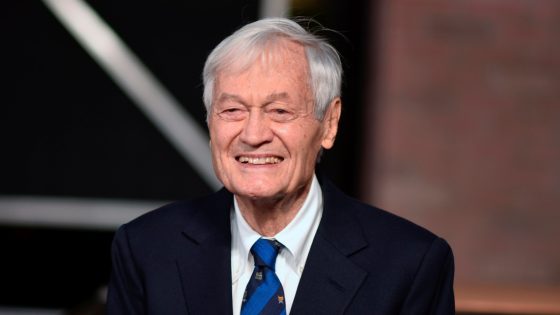Roger Corman, a prolific producer of inexpensive B movies who also mentored future Hollywood luminaries, including directors Francis Ford Coppola, Ron Howard and Martin Scorsese, has died. He was 98.
He died on May 9 at his home in Santa Monica, California, his family said on social media. A cause of death wasn’t given.
“He was generous, open-hearted and kind to all those who knew him. A devoted and selfless father, he was deeply loved by his daughters,” his family said in a statement. “His films were revolutionary and iconoclastic, and captured the spirit of an age.”
Corman had long been called the “King of the Bs,” having made hundreds of B movies in his almost seven decades as an independent producer and director. He was awarded an honorary Oscar in 2009.
His legacy extends far beyond his own movies. Corman pulled into his orbit over the years a constellation of rising stars, including future A-list directors like Coppola, Scorsese, Ron Howard and Jonathan Demme. And he jumpstarted the careers of Jack Nicholson, Dennis Hopper, William Shatner and Robert De Niro, among other household names.
Corman was born in Detroit, Michigan, in 1926. He studied engineering, but shifted his attention to Hollywood in the mid 1950s. Corman made all types of genre films, including science fiction, westerns and pulpy crime dramas. He had an early hit as a producer with “Monster from the Ocean Floor,” which was followed a few years later by “Attack of the Crab Monsters.” He produced nine “Bloodfist” movies, from the 1989 original to “Bloodfist 2050” in 2005.
Director Roger Corman and actor Dennis Hopper pose at a special screening of Dennis Hopper’s “The Last Movie”, newly restored, at the Playboy Mansion on May 31, 2005, in Holmby Hills, California.
Kevin Winter/Getty Images
Many of his early films were produced on shoestrings with on-set schedules that lasted days or weeks, rather than months. His first handful of films were shot in about 10 days for less than $60,000 each, Corman said at a 2016 Academy event.
He founded New World Pictures, a production company, and later Concorde-New Horizons, which focused on home video. He said in 2009 that he saw film as a “compromised” art, one that had to exist in between art and the world of business.
He was known in the industry for preaching about the value of pre-production, planning his film shoots down to every detail, including camera placement, long before the cast and crew arrived on set. He would later hand those skills down to his directing disciples, including Scorsese.
“My theory was this … when you’re shooting on a tight schedule like that, you don’t have time to make important decisions,” Corman said. “You just have time to shoot.”
He made shoot-’em-ups, monster movies and horror films with punchy titles, including “The Brain Eaters,” “Teenage Cave Man,” “The Wasp Woman” and “Attack of Giant Leeches.” He produced “The Little Shop of Horrors,” which came out in 1960 and featured actor Jack Nicholson in one of his first roles.
Two of Sylvester Stallone’s first on-screen appearances were in “Capone” and “Death Race 2000,” both made by Corman and released in 1975. Stallone told Entertainment Weekly in 2009 that it felt “felt like the big time” when was cast in “Capone.”

Roger Corman arrives at the Los Angeles premiere of “The Irishman,” Thursday, Oct. 24, 2019, at the TCL Chinese Theatre.
Richard Shotwell/Invision/AP
“We did ‘Death Race 2000’ in two and a half weeks. It shows it can be done,” he told the magazine. “It’s one thing to talk a game. Roger let you play the game.”
Corman described his producing process in the 2023 book “Hollywood: The Oral History,” by Jeanine Basinger and Sam Wasson, saying that he would make an “even trade” with directors who were looking to make their first film.
The director “gets a small amount of money and makes his film. I get the profit off the film, and he gets the opportunity to start his career,” Corman said.
Coppola, for example, had been his assistant for months before Corman produced Coppola’s first feature-length film, “Dementia 13,” which was released in 1963.
Coppola had been helping with sound recording and working as a second assistant director on one of Corman’s features, Corman told Conan O’Brien on “Conan on TBS” in 2014.
“I knew he was good, but I had no idea he was going to go to the heights he did,” Corman said.

Filmmaker Roger Corman, left, poses with actress Lauren Bacall, center, and cinematographer Gordon Willis, right, with their Honorary Oscars in Hollywood, California, Nov. 14, 2009.
Fred Prouser/Reuters
Ron Howard was a 23-year-old actor when he approached Corman about making his first length feature, “Grand Theft Auto,” which was released in 1977.
“I said, ‘Ron, you always looked like a director to me,'” Corman recalled saying to Howard in the moment.
Howard said late Saturday he was “grateful to have known him.”
“He launched many careers & quietly lead our industry in important ways,” Howard said on social media. “He remained sharp, interested and active even at 98.”
Several of those young directors would later ask Corman to act in their big-budget Hollywood movies. He appeared in Howard’s “Apollo 13” and Coppola’s “The Godfather: Part II.” Demme cast him in small roles in “The Silence of the Lambs,” “The Philadelphia Story” and “The Manchurian Candidate.”
Even running into Corman by chance could change someone’s trajectory in the industry. At a screening of “Baby Angels” in 1965, Corman happened to be sitting behind Peter Bogdanovich, who was then working as a journalist and film critic.
The pair were introduced and Corman, in Bogdanovich’s retelling in a 2022 interview, said, “I read your stuff in Esquire, would you ever want to write a movie?”
Bogdanovich, who would become an Academy Award-nominated director and writer, said that Corman was offering him an opportunity to enter the business, but little pay and no recognition.
“[Corman] said, ‘I’d like you to do a rewrite. There’s no money in it — $300 — you get $300 and no credit,'” Bogdanovich said. “I said, ‘OK, great.'”

Roger Corman, wife Julie Corman and daughters attend ‘An Evening With Roger Corman’ hosted by The Academy Of Motion Picture Arts & Sciences & Metrograph, at Metrograph on May 3, 2018, in New York City.
Rob Kim/Getty Images
When Director Quentin Tarantino was a kid, he would stay up late watching Corman’s movies on TV, he said as he introduced the producer at an honorary Oscar ceremony in 2009. He remembered watching “Bucket of Blood,” “Machine Gun Kelly” and “Rock All Night” on the little screen.
Tarantino again introduced Corman in 2023 at the Cannes Film Festival, saying of Corman: “He’s filled my eyes, my head, my heart and those of countless audiences, with unadulterated cinematic pleasure for decades.”
Corman is survived by his wife, Julie, and his daughters, Catherine and Mary, the family said in a statement on Sunday.
“When asked how he would like to be remembered, he said, ‘I was a filmmaker, just that,'” the family said.
Source Agencies



